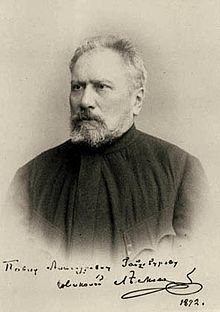The story of the Christian Theodor and his friend, the Jew Abraham
The story of the Christian Theodor and his friend, the Jew Abraham ( Russian Сказание о Федоре-христианине и о друге его Абраме-жидовине , Skasanije o Fedore-christijanine io druge JEWO Abrame-schidowine ) is a story of the Russian writer Nikolai Leskov , the 1886 appeared in the December issue of the Moscow magazine Russkaya Mysl . The author took the material for this legend from the prologue , the Slavic version of a Synaxarion for the city of Constantinople .
content
In 330 AD the Greek Byzantium was renamed Constantinople . Shortly before this date, a Christian merchant and a Jewish goldsmith lived side by side in that town . Her sons Theodor and Abraham grew up as friends in both gardens, which were not separated by a fence. The boys attended the school of the Greek Pamphylos together. When the Christians gained the upper hand in Constantinople, the Greek school was closed and each of the boys went to the school of his denomination. For the Jews were given by Moses , i.e. the Old Testament , but the Christians still had Christ , i.e. the New Testament , in addition . In the dispute about the better of the two religions, the adolescent former friends became enemies. The fathers fought and died in discord. Theodore and Abraham got along again and each took up his father's profession.
Both of them become wealthy citizens.
Theodore loses his beloved wife and all of his children through illness. When a business partner cheats on him, he is left penniless. The Christians in the city believe that God punished Theodore because he is friends with an enemy. Abraham learns about it and confronts his friend; recommends the end of friendship that began as a child. Theodor can't do it.
When Theodore loses his remaining possessions due to a lightning strike, Abraham lends him money. Theodore buys goods that are in demand in Alexandria , equips a ship and becomes rich in Egypt. On the way back, he only saves bare life in the event of a shipwreck. The process is repeated twice. Theodore is wiser the third time. He hands over the generated surplus value, i.e. the money, to seafarers who bring it safely to Constantinople and hand it over to Abraham. Abraham is not a usurer. He does not accept the interest, but in old age he does charitable work with his friend Theodor in Constantinople .
German-language editions
Output used:
- The story of the Christian Theodor and his friend, the Jew Abraham. German by Günter Dalitz. P. 379–407 in Eberhard Reissner (Ed.): Nikolai Leskow: Collected works in individual volumes. The juggler pamphalon. 616 pages. Rütten & Loening, Berlin 1971 (1st edition)
Web links
- The text online at Lib.ru / Classic (Russian)
- Entry in the Laboratory of Fantastics (Russian)
- Entries in WorldCat
Individual evidence
- ↑ Russian prologue (book)
- ↑ Edition used, p. 381 below
